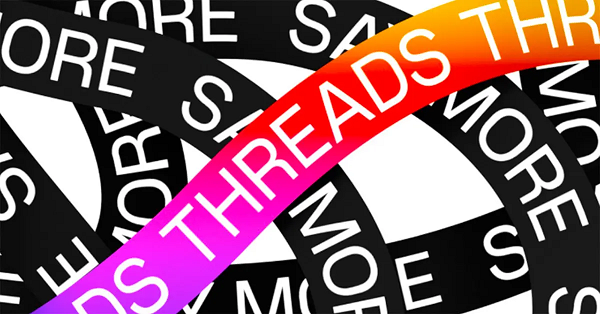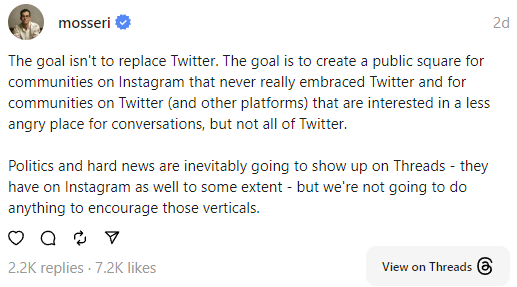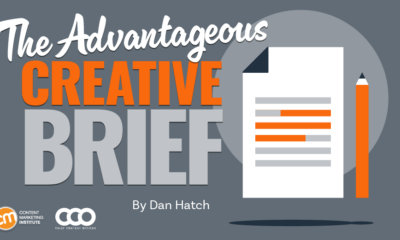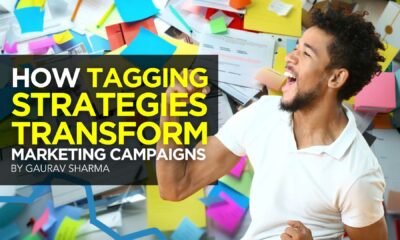SOCIAL
Threads Reaches 100 Million Members in Record Time

As expected, Meta’s new Threads app has now become the fastest-growing app of all time.
The much anticipated Twitter alternative, launched a day earlier than expected on Wednesday last week, quickly rushed to 30 million sign-ups within 24 hours of release. It then rose to 50 million just hours later, then 70 million within less than two days.
And now, Threads has crossed the 100 million sign-up marker, making it the quickest app to 100 million members.
As you can see in this chart, shared by Quiver Quantative, which is tracking Threads account numbers shown on Instagram pages, the app crossed the 100 million sign-up marker early Monday morning.
Threads’ rapid growth beats out ChatGPT to take the fastest-growing app title, with the ChatGPT app reaching 100 million users in two months earlier this year. So it’s beat it by quite a comfortable margin – though contextually, the situation is a lot different right now than it has been for many other apps, in terms of broad-ranging mobile adoption and data access, while Meta’s also, of course, using the network effects of Instagram to both amplify and simply Threads sign-up.
It’s also worth noting that ‘sign-ups’ and ‘active users’ are two different measurements. And while Threads has succeeded in getting millions of people to create an account, we don’t have any insight into how engaged they are as yet, and how much time they’re spending in the app.
But even getting them there in the first place is a significant first step. And when you also consider that Twitter has around 250 million daily actives, the fact that Threads has gathered so much momentum so quickly bodes well for its potential as a challenger app.
If that’s what it actually is.
Interestingly, Instagram chief Adam Mosseri has noted that the discussion they’re looking to encourage in Threads is a little different to Twitter’s focus, in news and current events.

So rather than courting journalists and news outlets, as Facebook has done in the past, Meta’s now looking to continue its gradual shift away from news and political discussion, in order to focus on more positive, human interaction and, seemingly, more light entertainment.
So how do you do that, in an algorithmic sense?
This will be a difficult challenge to solve, because the most engaging content, historically, has been posts that trigger emotional response, with the emotions that are most likely to spark virality being anger and joy. And while joy would ideally become the focus in that context, anger is easier to illicit – which is at least part of the reason why we’ve seen the media landscape become so divisive and partisan, as outlets look to generate more attention, and drive more traffic, by tapping into this element.
If you want to go viral, provoke a strong response. This, historically, has been the best way to drive social platform engagement.
So how does Meta counter this, and usher Threads users towards more positive interactions?
Mosseri hasn’t provided a roadmap, but he has said that they’re seeking to amplify content that people are more likely to share with friends, as opposed to public sharing, while he’s also noted that the platform ‘won’t discourage or down-rank news or politics’ as such.
“We just won’t court them the way we have in the past. If we are honest, we were too quick to promise too much to the industry on Facebook in the early 2010s, and it would be a mistake to repeat that.”
Mosseri’s referring to the constant on-again, off-again relationship Meta has had with news publishers in the past – pushing them to build a Facebook following, then taking away their reach, urging them to make video a priority, then de-prioritizing video ranking, creating a separate News tab, then shutting it down.
Given its scale and reach, each of Meta’s decisions in this respect can have a big impact, and according to Mosseri, the company now believes that it was a mistake to use that influence to its own end, given the broader negative impacts that it’s had on publishers, perception of Meta’s business, negative user experience, etc.
The Cambridge Analytica scandal was a major turning point in this respect, in regards to highlighting the influence that Facebook can have on people’s responses, and how Facebook, with data on billions of users, does indeed have the potential to sway political action. That prompted Zuck and Co. to take this element more seriously, and since then, Meta has gradually been evolving its approach, in order to reduce the presence of politics within its main feeds, and re-align engagement around entertainment.
TikTok has also helped to shift Meta’s perspective here, by showing that users are now less keen to hear from friends and family, and more interested in using social platforms as a discovery tool. Social sharing behaviors have evolved, to the point where more friend and family discussion is now occurring in private DM chat groups, as opposed to users sharing to the main feed, which effectively transforms social apps into entertainment feeders, with their algorithms now showing you more content that you may be interested in, from sources that you don’t already follow.
This is the main change in approach that Mosseri is pointing to here, that news and politics no longer needs to be a focus, because Meta doesn’t benefit from that engagement in the same way that it can from highlighting the most entertaining content from across its apps.
News posts will still gain traction, and will remain a part of the broader discussion, but essentially, Meta no longer feels the need to make this a specific focus – it can live without people provoking each other with divisive political takes.
But again, it will be difficult to reduce the amplification of such, given the emotional drivers at play, though Mosseri seems confident that Meta has at least some solutions here.
Speaking of solutions, Mosseri has also pointed to some coming developments for the Threads app, which is still in its very early stages.
So, if you’re wondering:
- Improved search is coming, beyond the current basic user search option
- Threads will have active hashtags, which may or may not be necessary in a modern social app, given algorithmic matching and text ID. But they’re coming anyway
- Yes, there will be a separate following feed, so you don’t have to sift through all those recommendations if you don’t want to
- Meta’s still working on its decentralized elements, which will enable graph syncing and portability
- It’s also exploring an auto-archive option, to keep your profile fresh, and avoid negative association with past, ill-advised Threads posts
- Mosseri seems lukewarm on adding in-app DMs – I suspect because if it were to do so, Meta would prefer to link that option back into Messenger/WhatsApp/Instagram Direct. Meta’s been working to integrate all of its messaging tools into a single platform, so adding another, separate one seems somewhat counter-intuitive
Mosseri says that all of these elements are in development, but also warms that they will take some time to develop. But now that Threads is the fastest-growing app of all time, you can bet that Meta’s giving it its full focus, as it works to build on that early hype.
So what does this mean for Twitter, and how will Twitter respond to the rapid rise of the new app?
Well, aside from taking legal action over potential violations of its IP, there’s not a lot that Twitter can do, other than hope that its own network effects and approach prove more appealing to its audience.
Twitter chief Elon Musk has made a strong stand on free speech, and allowing more types of discussion in his app, which looks set to become a differentiator between the two, as Instagram sticks with Meta’s broader approach to content moderation. Which also, incidentally, ports over verification info from IG, which remains a valuable element in interpreting content in its apps.
Will users prefer the ‘free and open’ approach of Twitter, which will seemingly make news and politics a central focus, or will the more entertaining alignment of Threads, if it can get it right, win the race?
One thing I would note is that many journalists, who Musk has been heavily critical of, are increasingly keen to stop posting to his app as a result of his attacks. Elon seems to think that discrediting the ‘mainstream media’ , and slating writers that he doesn’t agree with, is a pathway to a better information ecosystem within the Twittersphere – but he may have underrated the value that these journalists actually bring to his app.
If they go, their audiences will follow, and that could spark a much bigger habitual shift.
Also worth noting – Mosseri has explained the situation in regards to being theoretically unable to delete the Threads app without deleting your IG account:
So you can deactivate your Threads account, and Meta’s looking to separate the two profile types in future.
SOCIAL
Snapchat Explores New Messaging Retention Feature: A Game-Changer or Risky Move?

In a recent announcement, Snapchat revealed a groundbreaking update that challenges its traditional design ethos. The platform is experimenting with an option that allows users to defy the 24-hour auto-delete rule, a feature synonymous with Snapchat’s ephemeral messaging model.
The proposed change aims to introduce a “Never delete” option in messaging retention settings, aligning Snapchat more closely with conventional messaging apps. While this move may blur Snapchat’s distinctive selling point, Snap appears convinced of its necessity.
According to Snap, the decision stems from user feedback and a commitment to innovation based on user needs. The company aims to provide greater flexibility and control over conversations, catering to the preferences of its community.
Currently undergoing trials in select markets, the new feature empowers users to adjust retention settings on a conversation-by-conversation basis. Flexibility remains paramount, with participants able to modify settings within chats and receive in-chat notifications to ensure transparency.
Snapchat underscores that the default auto-delete feature will persist, reinforcing its design philosophy centered on ephemerality. However, with the app gaining traction as a primary messaging platform, the option offers users a means to preserve longer chat histories.
The update marks a pivotal moment for Snapchat, renowned for its disappearing message premise, especially popular among younger demographics. Retaining this focus has been pivotal to Snapchat’s identity, but the shift suggests a broader strategy aimed at diversifying its user base.
This strategy may appeal particularly to older demographics, potentially extending Snapchat’s relevance as users age. By emulating features of conventional messaging platforms, Snapchat seeks to enhance its appeal and broaden its reach.
Yet, the introduction of message retention poses questions about Snapchat’s uniqueness. While addressing user demands, the risk of diluting Snapchat’s distinctiveness looms large.
As Snapchat ventures into uncharted territory, the outcome of this experiment remains uncertain. Will message retention propel Snapchat to new heights, or will it compromise the platform’s uniqueness?
Only time will tell.
SOCIAL
Catering to specific audience boosts your business, says accountant turned coach

While it is tempting to try to appeal to a broad audience, the founder of alcohol-free coaching service Just the Tonic, Sandra Parker, believes the best thing you can do for your business is focus on your niche. Here’s how she did just that.
When running a business, reaching out to as many clients as possible can be tempting. But it also risks making your marketing “too generic,” warns Sandra Parker, the founder of Just The Tonic Coaching.
“From the very start of my business, I knew exactly who I could help and who I couldn’t,” Parker told My Biggest Lessons.
Parker struggled with alcohol dependence as a young professional. Today, her business targets high-achieving individuals who face challenges similar to those she had early in her career.
“I understand their frustrations, I understand their fears, and I understand their coping mechanisms and the stories they’re telling themselves,” Parker said. “Because of that, I’m able to market very effectively, to speak in a language that they understand, and am able to reach them.”Â
“I believe that it’s really important that you know exactly who your customer or your client is, and you target them, and you resist the temptation to make your marketing too generic to try and reach everyone,” she explained.
“If you speak specifically to your target clients, you will reach them, and I believe that’s the way that you’re going to be more successful.
Watch the video for more of Sandra Parker’s biggest lessons.
SOCIAL
Instagram Tests Live-Stream Games to Enhance Engagement

Instagram’s testing out some new options to help spice up your live-streams in the app, with some live broadcasters now able to select a game that they can play with viewers in-stream.
As you can see in these example screens, posted by Ahmed Ghanem, some creators now have the option to play either “This or That”, a question and answer prompt that you can share with your viewers, or “Trivia”, to generate more engagement within your IG live-streams.
That could be a simple way to spark more conversation and interaction, which could then lead into further engagement opportunities from your live audience.
Meta’s been exploring more ways to make live-streaming a bigger consideration for IG creators, with a view to live-streams potentially catching on with more users.
That includes the gradual expansion of its “Stars” live-stream donation program, giving more creators in more regions a means to accept donations from live-stream viewers, while back in December, Instagram also added some new options to make it easier to go live using third-party tools via desktop PCs.
Live streaming has been a major shift in China, where shopping live-streams, in particular, have led to massive opportunities for streaming platforms. They haven’t caught on in the same way in Western regions, but as TikTok and YouTube look to push live-stream adoption, there is still a chance that they will become a much bigger element in future.
Which is why IG is also trying to stay in touch, and add more ways for its creators to engage via streams. Live-stream games is another element within this, which could make this a better community-building, and potentially sales-driving option.
We’ve asked Instagram for more information on this test, and we’ll update this post if/when we hear back.
-
SEARCHENGINES5 days ago
Daily Search Forum Recap: April 29, 2024
-

 MARKETING6 days ago
MARKETING6 days agoMicrosoft unveils a new small language model
-

 SEARCHENGINES6 days ago
SEARCHENGINES6 days agoOffline For Last Days Of Passover 5784
-

 SEO7 days ago
SEO7 days agoStudio By WordPress & Other Free Tools
-

 MARKETING6 days ago
MARKETING6 days agoQuiet Quitting vs. Setting Healthy Boundaries: Where’s The Line?
-
SEARCHENGINES4 days ago
Daily Search Forum Recap: April 30, 2024
-

 PPC6 days ago
PPC6 days agoHow to Promote Your Digital Marketing Agency: 4 Growth Strategies
-

 MARKETING4 days ago
MARKETING4 days agoHow To Develop a Great Creative Brief and Get On-Target Content












